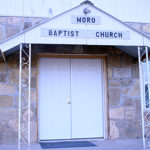RALEIGH, N.C. (ABP) — Jesse Helms, the Baptist former senator who battled communist oppression but backed right-wing dictators and opposed abortion while appealing to racist sentiment, was a polarizing figure who was lionized by some conservatives and vilified by many liberals.
The Republican, who died July 4 at age 86, may also be a remembered as an example of the vast diversity still found in mainstream Baptist life.
Helms represented his native North Carolina for three decades in the Senate before retiring in 2003. His body lay in repose in the sanctuary at Hayes Barton Baptist Church in Raleigh July 7, and his funeral was held at the church July 8.
Ultra-conservative member of moderate church
|
Jesse Helms
|
The ultra-conservative senator’s long-time membership in the moderate congregation — affiliated with both the Cooperative Baptist Fellowship and the Southern Baptist Convention — may surprise some observers. Baptist historian Bill Leonard said July 8 that he knew Helms was a Hayes Barton member, but was “floored” to learn that the late senator had been a deacon at the church, which employs a female associate pastor.
“I think that’s part of the irony and complexity of Baptist local autonomy,” said Leonard, who is the dean of the Wake Forest University Divinity School in Winston-Salem, N.C.
Helms “was a man of consistent conviction to conservative ideals and courage to faithfully serve God and country based on principle, not popularity or politics,” said Billy Graham, in a statement released shortly after Helms’ death was announced. The long-time evangelist had been friends with his fellow North Carolinian for years.
Richard Land, head of the SBC’s Ethics and Religious Liberty Commission, said it was appropriate that Helms died on Independence Day. “He was a patriot. … He was a very strong pro-life, very strong pro-family and very strong anti-communist advocate,” he noted, according to an article from Baptist Press, the SBC’s news agency.
But moderates, liberals and some conservatives noted several of the dark spots on his record, most notably Helms’ strenuous opposition to virtually all civil-rights legislation that came before Congress during his tenure.
Sign up for our weekly edition and get all our headlines in your inbox on Thursdays
Stains on his record
He first rose to prominence in North Carolina as a television journalist in the 1960s. As an executive of the company that owned Raleigh’s WRAL-TV, a CBS affiliate, he became famous for delivering five-minute nightly commentaries during the station’s evening news broadcast. In them, he frequently railed against “the so-called civil-rights movement,” big government, taxes and those he viewed as cultural elitists. He once infamously referred to the University of North Carolina in nearby Chapel Hill as “the university of negroes and communists.”
After Helms was elected to the Senate in 1972, he opposed civil-rights legislation and backed the racist apartheid regime in South Africa. In 1983, he led an unsuccessful filibuster to prevent the creation of the federal Martin Luther King Jr., holiday, claiming that historians had not adequately explored King’s and other civil-rights leaders’ alleged ties to communists.
Helms never apologized for any of his views on civil rights and in later years defended himself, saying he opposed the movement not on racial grounds, but on states’-rights principles. He — and his defenders, such as Land and former Kansas senator Bob Dole — pointed to his personal friendships with African-Americans, including some who worked on his Senate staff. One of them was James Meredith, the black man who integrated the University of Mississippi.
But his fellow conservative David Broder, writing a column about Helms’ retirement from the Senate in 2001, called him “the last prominent unabashed white racist politician in this country — a title that one hopes will now be permanently retired.”
He faced similar criticism for his foreign-policy views. After Helms was elected to the Senate in 1972, he used his perch as chairman of the Senate Foreign Relations Committee to battle the threat of communism in the Third World, and particularly Latin America. He gained a reputation as a supporter of many right-wing military dictatorships, most notoriously that of former Chilean president Augusto Pinochet.
"Blind spots"
Helms also had a close association with right-wing El Salvadorian leader Roberto d’Aubuisson. He was identified by the State Department as the man who ordered the murder of San Salvador Archbishop Oscar Romero — done while the anti-poverty activist presided over the cathedral altar at a communion service.
Helms also came under heavy criticism for his staunch opposition to funding for AIDS research and relief, once saying that responsibility for every instance of the disease could be traced, ultimately, to “sodomy.” Late in his career, Helms changed his mind on AIDS relief — thanks to the efforts of rock musician and global activist Bono — and supported $500 million in funding to help fight the global scourge.
The SBC’s Land acknowledged that Helms had “blind spots,” noting the late senator’s staunch support of the tobacco industry. “And, while there was ample evidence that he was not personally a racist, when he opposed the Martin Luther King Holiday as vigorously as he did, it was not one of his finer moments,” he said in the BP article.
But Helms was reportedly well regarded at his Raleigh church, where he served as a deacon and in other roles. The congregation has long been active in moderate Baptist life, with many members serving in leadership roles with CBF and other organizations that resisted the SBC’s rightward movement in the 1980s.
Helms also donated his personal papers and endowment funds to Wingate University, one of two moderate Baptist schools (along with Wake Forest) he attended. They are now housed at the Jesse Helms Center on the university’s campus in Wingate, N.C.
Wake Forest’s Leonard said that Helms’ long-time support of a church and a school that many of his political allies would regard as liberal or even heretical is illustrative of “the complexity of Southern religious life, particularly with regard to the Southern Baptist Convention.”
Mentioning Helms alongside fellow Baptist Jimmy Carter, Leonard said, both “have, apparently, maintained deep ties to what I would call a kind of traditional pre-controversy Southern Baptist identity.”
One way to explain that, the Wake Forest University Divinity School dean said, is that, “Just as all politics is local, all … Baptistness is local. And apparently Jesse Helms invested his life in a congregation and decided to stay in that congregation even though he had differences with … the direction of that congregation in the [SBC] controversy.”














We seek to connect God’s story and God’s people around the world. To learn more about God’s story, click here.
Send comments and feedback to Eric Black, our editor. For comments to be published, please specify “letter to the editor.” Maximum length for publication is 300 words.